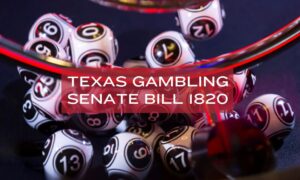
A Texas Appeals Court in Fort Worth found on April 11 that eight-liner slot machines were unconstitutional and therefore illegal.
This ruling culminated over five years of legal scuffles between game room operators and city officials decrying their deleterious effects on the community. No longer can these gaming staples hide behind an obscure loophole colloquially known as the “fuzzy animal” exception.
Eight-liner operators will instead have to accept the reality that their machines are technically “lotteries,” which the Texas State Constitution outlaws in almost every sense.
They are named eight liners due to the game of chance where symbols that line up in one of eight lines — three horizontal, three vertical, or two diagonal — win a prize.
The only type of coin-operated games allowed in Texas are coin operated amusement machines, or COAMs. And even COAMs have a long history of legal controversy in the state. Also, the only legal form of lottery in Texas is the Texas Lottery.
Eight-liners lived in a ‘fuzzy’ legal area for years
In 1993, Texas passed a statutory amendment to the state Penal Code creating space for eight-liner slot machines in game rooms.
This amendment relaxed the previous statute that made all “gambling devices – electrical, electromechanical, or mechanical” – illegal. It stipulated that a slot machine would be legal if it produced a prize “not more than 10 times the amount charged to play the game or device once or $5, whichever is less.”
This stipulation became known as the “fuzzy animal” exception because it allowed for gaming machines that produced stuffed animal prizes. The spirit of the law focused on places like Peter Piper Pizza and Chuck E. Cheese. However, adult game rooms proliferated greatly through their ability to now offer eight-liner slot machines that paid out small-scale, non-cash prizes.
Owners typically placed game rooms inconspicuously in strip malls, at the far end of parking lots, and other out-of-the-way settings. That’s because city officials were concerned with the clientele who frequented them and the eyesore they could become for the community.
Game room operators have skirted the issue of having to offer up novelty items for play in several ways. Most of which have been challenged and struck down in court.
For example, winners have received gift certificates for local grocery stores in denominations of $5 or less. They have also received vouchers to play different games in the game room.
In both cases, the court ruled that the prizes represented cash-related prizes and so were not permitted. Other practices in game rooms allow players to “bank” prizes. That is, to win prizes larger than $5, similar to the way children save skeeball tickets. This too has been struck down in the courts.
Now, however, the Texas Appellate court has dispensed with debating “fuzzy animal” exceptions. And instead ruled against eight liners using a preemptive constitutionality claim.
In simplest terms, eight-liners are lotteries
The Texas State Constitution in its earliest iteration (1845) defined the lottery as a game that entailed “chance, consideration, and prize.” While this definition doesn’t draw to mind the lottery most people are familiar with, the conditions are there:
- Chance: The potential to win is left to chance
- Consideration: A payment is needed to participate
- Prize: A prize of tangible value (typically monetary) is awarded to the winner
What the Texas Appellate Court ruled on April 11 was that eight liners are nothing more than a lottery, and lotteries, except for state lotteries, are illegal.
As mentioned, this case has been moving around the Texas court system for over five years, with rulings typically addressing the varying limitations of the fuzzy animal exception and the taxing of game rooms.
What the city of Fort Worth has most recently claimed is that the fuzzy animal exception is a legal ploy. One meant to circumvent the state constitution’s language outlawing lotteries, which eight-liners are.
In the current case, City of Fort Worth v. Rylie, the defendants’ argument in favor of eight liners relied on the courts making special provisions for what it deemed as “lotteries,” since the original definition of the term was overly broad and most people would never associate a slot machine with a lottery.
In a sense, Rylie and her co-defendents hoped to keep eight-liners in the legal gray area. They hoped to create another exception similar to the fuzzy animal exception. The court flatly denied this claim since the basic premise of an eight-liner slot machine “inarguably conforms to the constitutional meaning of ‘lottery’” and no such redefining is needed.
The future of eight-liners now rests with voters
There is a good chance that the appeals court’s ruling will make its way to the Texas Supreme Court again. But it seems unlikely the Court will waver from the appellate court’s decision.
The only remaining avenue for these machines is a constitutional amendment. That would entail a two-thirds majority in both houses and a vote by the public.
Legislation addressing legalized gambling will heavily influence the 2023 legislative session. And that makes plenty of room for eight-liners to receive attention. Whether they receive the votes needed to show up on the ballot will foretell much of the current legislature’s taste for legalized gaming in Texas.







